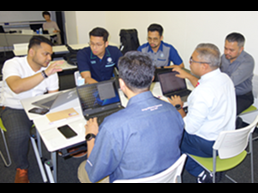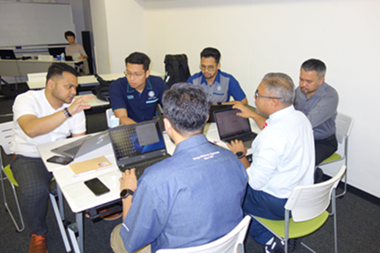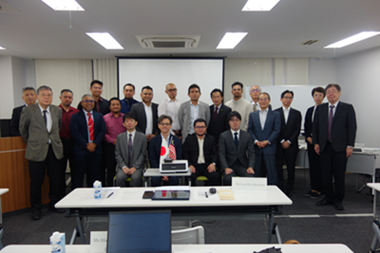
ECCJ held the 11th energy conservation invited training program for Malaysia (BECMY11)
Under the entrustment of the Agency for Natural Resources and Energy (ANRE), the ECCJ(Energy Conservation Center, Japan) has been implementing a bilateral energy efficiency and conservation cooperation project with Malaysia. This year, a four-day training program was implemented from October 21 to 24, 2024, for a total of 11 participants from the Malaysian government, its affiliated organizations, and three private companies. The training program, aimed at enhancing Malaysia’s energy management system, included lectures on Japan’s energy management practices and an inspection tour of a factory awarded the Energy Conservation Grand Prize.
 |  |
Overall group photograph | Training at the mini-plant |
1. Participants in the training program
(1) Malaysian side: 1 from the Ministry of Energy (PETRA), 3 from the Sustainable Energy Development Agency (SEDA), 2 from the Energy Commission (EC), and 1 from each of the 3 private companies involved in the pilot project, for a total of 11 persons.
(2)Japanese side: 2 from METI, 6 from ECCJ International Cooperation Division
2. Overview of the training program:
(1) Objective: On June 25, 2024, the Energy Conservation Law encompassing the heat sector was approved by the Parliament of Malaysia and is scheduled to take effect in 2025. Taking this opportunity, ECCJ conducted lectures on Japan’s energy management system and factory visit awarded the Energy Conservation Grand Prize as part of capacity-building efforts related to “energy management” for government officials, etc with the aim of supporting the formulation and operation of systems in their countries.
(2) Opening and Closing Remarks: Greetings from representatives of METI, Malaysian Ministry of Energy, and ECCJ
(3) Contents:
① Keynote Speech (METI); Japan’s Energy Conservation Policy
② Country report; Energy Conservation Law and National Energy Conservation Action Plan, Energy Management Information System, Energy Conservation Audit Subsidy Program
③ Lecture; Japan’s Energy Conservation Law, periodic reporting and SABC Evaluation System, EC Guidelines and EM Manuals, Benchmarking System
④ Factory visit; Yakult Central Institute, Riken Vitamin Soka Factory
⑤ Group discussion: Participants were divided into two groups to discuss and present on the following topics: “Establishment of an evaluation and feedback system for Energy Management Information Systems of designated business operators ” and “Results, analysis, and dissemination of the conditional subsidy program for energy audits.”
(4) Evaluation: Lectures on Japan’s periodic reporting and evaluation methods, EC Guidelines, and EM Manuals, along with factory visits and opinion exchanges at two factories implementing the contents of the training program, enabled participants to gain a deeper understanding of Japan’s Energy Conservation Laws. During the group work, the two groups engaged in enthusiastic discussions on their respective issues aimed at enhancing Malaysia’s e nergy management system and actively exchanged opinions during their presentations. As a result, the trainees remarked that the training program exceeded their expectations.

